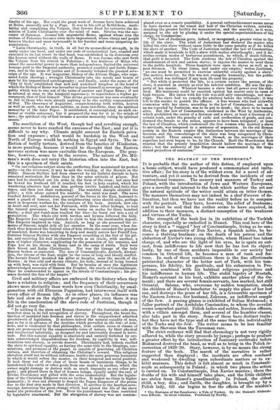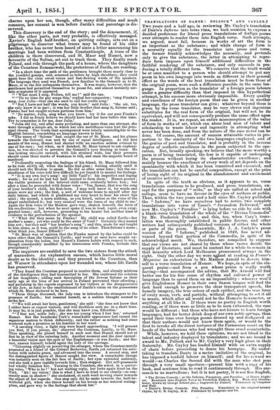THE BOATMAN OF THE BOSPHORUS. * IT is probable that the
author of this fiction, if employed upon a home subject, would have produced a commonplace and imita-
tive affair; for his story is of the wildest even for a novel of ad- venture, and yet it seems to be derived from the incidents of our conventional romance. The scenery and manners of Turkey and Poland, with the introduction of jews and Western Europeans, give a novelty and interest to the book which neither the art nor' the natural aptitude of the writer could attain on triter themes. The manners themselves may not indeed be a chef d'ceuvre of de- lineation, but then we have not the reality before us to compare with the portrait. They have, however, the relief of freshness; and it must be said that the author seems to have acquired, in addition to their manners, a distinct conception of the weakness and virtues of the Turks.
The strength of the book lies in its exhibition of the Turkish character, especially as embodied in Hamet. This real hero of the story is first a " ragged " boy of Constantinople, living as he can; then, by the generosity of Don Xavier, a Spanish noble, he be- comes a thriving boatman; on the death of his patron and the abduction of Xavier's two young children, -whom Hemet has taken charge of, and who are the light of his eyes, he is again an out- cast, from indifference to life now that he has lost its object; lastly, by one of those accidents impossible to our society but common in Oriental life, he becomes a man of rank and for- tune. In each of these conditions there is the fine affectionate patriarchal character of the better sort of Turk, with his tem- perance, his fidelity, his gratitude, and his submission to Pro- vidence, combined with his habitual religious prejudices and his indifference to human life. The stolid bigotry of Mustafa, Hamet's assistant in his boat, exhibits another phase of the Os- manli; and there are several female servants, less marked, but still Oriental. Salome, who, overcome by sudden temptation, steals the children of Hamet's benefactor to supply the place of her lost one, and destroys the peace of her life, is a favourable specimen of the Eastern Jewess; her husband, Zahronn, an indifferent sample of the Jew. A passing glance is exhibited of Sultan Mahmoud; a fuller portrait of the Archduke Constantine, to whom the novelist seems somewhat partial. Polish ladies and nobles, Russian officers, with a villain amongst them, and several of the humbler classes, also take part in the story. Some of these have distinct traits; but they have not the type and at the same time the individuality of the Turks and the Jew. The writer seems to be less familiar with the Slavonic than the Turcoman race.
The strict reckoner will find that chronology is not very rigidly adhered to, while the story proceeds by jumps ; perhaps to produce a greater effect by the introduction of Yanissary outbreaks before Mahmoud destroyed the band, as well as to bring in the Polish in- surrection of 1829-'30. Story, however, is by no means the strong feature of the book. The march of the narrative is rather suggested than displayed ; the incidents are often confused and weakened by dwelling upon subordinate matters or to es- hibit manners. This defect is felt almost as much in Constanti- nople as subsequently in Poland; in which two places the action is carried on. In Constantinople, Don Xavier marries ; there the deaths of his wife and himself take place, and the little children are stolen from Hamet's guardianship. In Poland, the eldest child, a boy, dies ; and Zarifa, the daughter, is brought up. by a Polish lady, till she begins to fear the effects of the maiden's • The Boatman of the Bosphorus: a Tale of Turkey. By the Osmanli Abderah- man Effendi. In three volumes. Published by Newby.
charms upon her son, though, after many difficulties and much romance, her consent is won before Zarifa's real parentage i,s die- oovered.
This discovery is the end of the story; and the denouement, if, like the other parts, not very probable, is effectively managed. Jr.avier's English half-brother, on quitting college, sets out on a pilgrimage to discover what traces may be found of his elder brother, who has never been heard of since a letter announcing his marriage had been written from Constantinople. A trace of the children is there discovered, and St. Maur and Hemet, now a favourite of the Sultan, set out to track them. They finally reach Poland, and ride through the park of a house, where the daughters of the Countess Romanowaki, the protectress of Zarifa, are residing.
"In a short time the path of the gentlemen brought them nearly close to the youthful gossips, and, screened as before by high shrubbery, they could again hear the clear sweet voices and fast-flowing words of the speakers. The language they used was French, now familiar to the Osmanli as to St. Maur, or to the fair colloquists themselves. It was music, however, that the gentlemen had permitted themselves to pause for, and almost instantly cer- tain symptoms of it appeared. " 'What must I sing, Fedora, tell me ? ' said the one. " no time for gay songs this,' replied her companion; 'sing Fianka's song, dear Julia—that one she used to call her cradle song.'
"'But I have not half the words, you know,' said Julia : 'the air, too, she only knew it in part ; it was her little brother that sang it, Salome said ; Fianka had but caught certain portions from him.' " 'No matter, Julia, sing what you know; try it for our poor Fianka's sake. I did so firmly believe we should have had her here before this time. Try to remember it for me, dear Julia.'
"Julia did try, and after some preluding, and more than one attempt, she went through a simple air, to which her own mellifluous voice lent the prin- cipal charm. The words that accompanied were totally unintelligible to the English listener, resembling no language known to him. "The name of 'Salome' had caught the ear of St. Maur, and his glance towards the Osmanli was met by one of equal intelligence. At the first sounds of the song, Hemet had started with an emotion seldom evinced by one of his race ; but when, as it finished, St. Maur turned to ask explana- tion, he was shocked to perceive the Osmanli's eyes floating in tears. He was looking straight onward, with lids strained wide, lest their pressure should cause those marks of weakness to fall, and stain the majestic beard of manhood.
"Profoundly respecting the feelings of his friend, St. Maur followed him as he rode slowly off, when the ladies had gone ; waiting silently until it should suit the Moslem to speak. He did so after some time ; but the un- steadiness of his voice told how difficult he yet found it to master his feelings.
" 'It is my own boy's song! my little Vasil's! his imperfect and lisping words ; for as yet he had but half learned to form them.' Hemet paused ; the visible presence of the beloved child came evidently before him ; but after a time he proceeded with firmer voice : 'Yes, Samor, that was the song of your brother's child, his first-born. I may well know it, for words and music were my own; the first, a sort of welcome home to myself after my daily labour; and which it gladdened my very heart to hear his sweet lips utter ; the second, a mere nothing, as you heard, unless as the voice of the singer embellished it ; but very musical were the tones of my child to me.' Again the firm voice of the Moslem gave way, shaken beneath the force of his recollections: but when he next spoke it was in loud, rapid, even exag- gerated tones ; still, however, presenting to his hearer but another kind of evidence to the perturbation of the speaker.
"'What did they mean by Fianka? My child was called Zarifa—her mother's name ; yet who could be the sister of Vasil? Certainly they named him not ; but they said "her brother's song "; and this, made for and taught to him alone, as it was, could be the song of no other. Then Salome's name ; what think you, Samor Effendi ? ' "St. Maur was of opinion that the Fianka named by the ladies could be none other than the Osmanli's Zarifa ; and would at once have sought ex- planation from the ladies, but Hamet's Eastern habits with respect to such, though considerably modified by his intercourse with Franks, forbade this precipitancy."
The inquirers are enabled to save the two sisters from the attack of marauders. An explanation ensues, which leaves little moral doubt as to the identity; and they proceed to the Countess, then at Warsaw in attendance upon her wounded son, whose life Zarifa has preserved.
"They found the Countess prepared to receive them, and already mistress of the intelligence they had transmitted to her. She confirmed the relation of her daughters ; adding such description of the Jewess Salome as their early age at the time of her arrival in Poland prevented their affording; and partaking in the regrets expressed by her visitors at the disappearance of the Jew, as fatal to the establishment of Zarifa's claim on the possessions which St. Maur declared to be hers.
"These things discussed, the lady rose to introduce the strangers to the presence of Zarifa ; but remitted herself, as a sudden thought seemed to strike her.
"We will await her here, gentlemen,' she said : 'she does not know that I either have or expect visitors, and will doubtless seek me in a short time. It may be, it is just possible, that she may know you, Effendim.'
"I fear not, noble lady ; she was too young when I lost her,' returned Hemet. But the handsome Turk's remarkable appearance had caused the sagacious matron to think differently, and the rather as nothing had since rendered such a presence as his familiar to her ward. "A caroling voice, a light step were heard approaching. 'I will present you first, if you please, sir,' observed the Countess, hastily, to St. Maw. thus speaking, she placed herself in such sort that Hemet should not at first be in view of the entering lady. Another moment and the door opened : a beautiful vision met the eyes of the Englishman—it was Zarifa ; and He- met, lumen himself, beheld again the lady of the carriage.
"Colouring slightly on perceiving the stranger, whom the Countess merely presented as a friend of the Colonel Berkovicz, Zarifa yet returned his salu- tation with infinite grace, and advanced into the room. A second step, and the distinguished figure of Hemet caught her view. A remarkable change was instantly seen on the fair face of Zarifa ; her eyes extended suddenly, and she took a pace rapidly towards him ; then stopped. Her self-possession had wholly forsaken her. Turning to the Countess, she asked, in a quiver- ing voice, 'Who is he ? ' but not waiting reply, her looks again fixed on the Turk. • Ah ! my vision ! this is what I have so tried to see clearly—so con- stantly seen in shadow !' she exclaimed, at each word moving closer towards the object of her regards. One step only did he make towards the half-be- wildered girl, when she threw herself on his bosom as her natural resting- place, and gave way to the feelings that shook her."



































 Previous page
Previous page